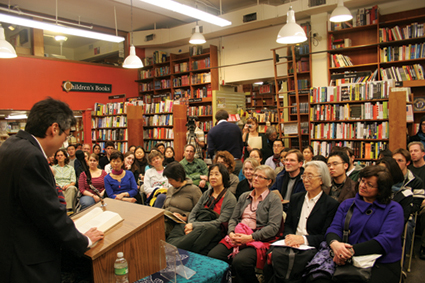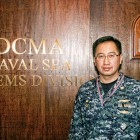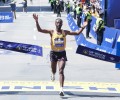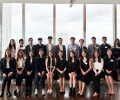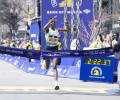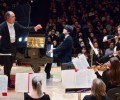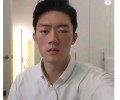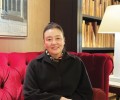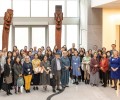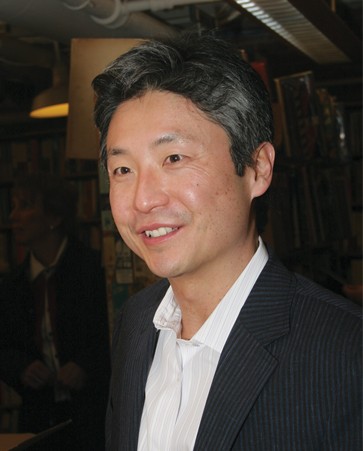
|
|
|
Writer Chang-Rae Lee meets with readers at Harvard Bookstore.
By Kelly Coi, Myong Sool Chang
Translated by Jay Kim
(Boston, BostonKorea) Korean American writer Chang-Rae Lee, receiver of the Hemingway Foundation award for his work on the first novel, “Native Speaker” which boasts his exceptional writing style, published his latest novel, “The surrendered.”
“The Surrendered,” took six years to complete and it portrays the lives of three main characters whose lives are intertwined within the background of the Korean War. It has received numerous press spotlights from leading newspapers such as the New York Times, Washington Post, and the Boston Globe.
Chang-rae Lee, professor at Princeton University visited the Harvard Bookstore on the 10th and held a book signing event along with an opportunity for his readers to converse with him. The reporter was able to have an interview with the writer just before the book signing began. Having finished his big book which took much longer than expected Chang-rae Lee seemed cheerful during the interview.
Chang-rae Lee makes it a goal to write gem-like 175 page short novels but he failed most of the time because he enjoys writing in impromptu sessions. Since Chang-rae Lee was a poet turned novel writer, instead of writing from a constructed synopsis he likes to ‘feel’ his way around through the main character. Chang-rae Lee commented that he believes, “Good writing is always true. It’s not objective truth, but a kind of emotional truth.”
Chang-rae Lee said he would like to present his novel as a gift to the Obamas. The following are questions and answers from the interview with Mr.Lee.
Q. The previous three novels were about personal identity. Can you compare ‘’The Surrendered” with your previous works?
A. My previous works usually contained a single narrator and the story went along with him, but this time around you must follow the story of the three characters. Therefore the storyline gets more complex and it has a tendency to be longer in length. However, the lives of those three characters become entangled and complicated. In whole it should be viewed from a wider perspective.
With those three who undergo a traumatic historical event, I wanted to portray primarily, the healing and the acceptance of each other.
Q. Is there any particular reason you chose to have the background in the 1950s and 1980s era?
A. The story begins with the Korean War in the 1950s. During the progress of the Korean War the three main characters experience severe trauma. Also I wanted to show a period in time where the ranges of their ages were just right for that part in the storyline. I chose the 80s because the main characters would be over their 70s if the setting was set in the present time. In truth, I based the beginning part of this novel from personal experiences of my father. Especially the part where people were fleeing by overcrowded train. Unimaginable as it seems, the refugees rode on the top and sides of the train because there was no room… My father told me about that when I was in college and that is why the novel began after the Korean War.
Q. At the present, how do you see Asian American literature and where should it be going in the future?
A. Although there are not many Asian American writers now but I see many young authors with great potential. The values and personal experiences of Asian American writers make their literary works more unique but those distinguishing characteristics should not necessarily segregate them within American literature. The important issue is how much Asian American writers are able express their uniqueness in their novels.
Q. Is there anyone you would like to present your novel as a gift?
A. I would like to give it to President Barack Obama. I heard Barack and Michelle Obama were avid readers. The reason for this is that my novel can show how much an individual’s life is affected through trauma and traumatic events such as war.
Q. What does Korea mean to you on a personal or a professional level?
A. It is very important in my life. It is both important for my family. Not just my Korean family but my mixed Korean American family. And obviously this book is very important. I don’t know that every book will be like my last book where Korea was not that significant in the book. But it will always be a little bit there, even in the background…because in my last book, the character, he married a Korean woman so there’s always something. That’s how I always think. It’s sort of like an atmosphere. There is always a little feeling. And that’s what I like. That’s who I am. Even though most of my life is not as a Korean. When I go to Korea I know I don’t belong there. I don’t speak the language well enough. But I still feel that there’s always something going on.
Q. For some time now there has been talk of “The surrendered,” being published. Does it usually take this long to complete a novel?
A. No. It usually doesn’t take as long. It took a lot longer because this book is a novel and I had to include a number of other stories. I am still learning as I work. The next book should not in any way take as much as six years to complete. I would really like to complete new novels every two to three years. That is my goal but I always miss that goal. Whenever I begin writing I think of a nice short gem-like novel of a book that contains about 175 pages.
Q. What is good writing?
A. One of the answers to ‘what’s good writing?,’ is that it has just this spark of emotional truth. There is a moment, either a description or a situation or a scene or what have you or detail that a reader will absolutely recognize and feel as truth.
Conversation with the author
The even to meet and speak with Chang-Rae Lee began after 7pm. inside the Harvard Bookstore. It was a good opportunity to observe Mr.Lee’s influence as a writer. There were not enough seats provided for the event and many people listened to the conversation standing up. There were well over a hundred people in the audience and Consul General Joo-suc Kim visited and participated during the event
The following are Q&A details
Q. The main characters are very interesting. Were they created based on people you have run into or were they made up?
A. Well most all of them were absolutely made up. I’ve always found it difficult to write about a real person because the reality of that person is so overwhelming. And unless they’re larger than life and endlessly charming and endlessly flawed, (unless) they’re so complicated and interesting it just doesn’t seem to work. And then of course when there’s reality you always feel as if you have to honor that in some way and as a fiction writer you don’t really want to do that. You want to honor what you need from that character in that story. I always feel as if it’s just more fun and actually easier to make people up… Naturally I think a lot of, all the characters come from some little part of me. Something I am or I think I am, or something I hear or maybe I like to hear too much.
Q. How do you plan your writing?
A. I plan very loosely. I sort of set up beacons in a vast ocean of nothingness. And the beacon will be say I want the characters to be here or have done this one thing in the scene and then I think they will end up in this place. But I really don’t know how I’m going to get to those points. The more I plan the less excited I tend to be. I think that’s really important. I’ve always thought writing is improvisation but purposeful improvisation. It’s a combination of two things.
Q. How do you collect data and portray the main characters?
A. Particularly in this book it was very hard to feel really comfortable because you can read until the end of time, visit the library of Princeton or the web these days… so you can do all those kinds of research but you still don’t have the kind of feeling and atmosphere that helps you and sometimes that comes from talking to somebody which I often try to do. For this book I talked to Koreans who were older and from that generation and over the years combatants. But also one the great things for me were pictures, photographs. And for this book in particular I was given a real huge stack of archival photographs from the big newspapers from Seoul from that year in 1950 to 1957 during the war and some years after the war. And looking at those pictures you couldn’t go back to Korea now and see anything. It’s completely different. But to see those pictures of ruined landscapes and ruined villages, the dusty roads and the mud and trails of refugees. And they were good pictures where you can see the people’s expressions, see what they were wearing. You can almost feel that. The other thing is that particularly for a book about war and the effects and the costs of war, they don’t make a lot of art…
Q. How did you come up with the title?
A. Well the book is really about how these three characters have surrendered to history. Surrendered to those profound forces of history. You can call it what you will, fate, destiny, or just chance. It is about being subjected to these forces that are out of their control. It’s also about, as characters themselves… so much of what they do is surrender to each other in certain ways, surrender to their own darkest parts, their own darkest selves, surrender to their own weaknesses. There is a lot of relenting in this book. Even though the action is unrelenting there is a lot of relenting going on.

 의견목록 [의견수 : 0]
의견목록 [의견수 : 0]

 프리미엄 광고
프리미엄 광고












